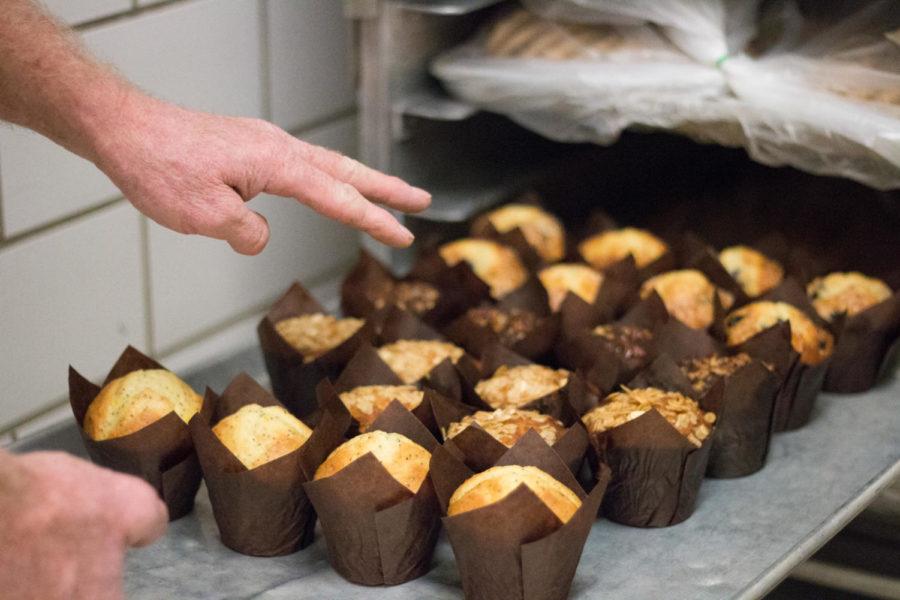ISU Dining continues to accommodate student diet restrictions
Emily Blobaum/Iowa State Daily
Mark Weber, bakery manager at Knapp-Storms Commissary, checks muffins before being loaded onto a transport cart.
November 8, 2017
At a school of over 36,000 students, ISU Dining is tasked with catering their dining options to students with a variety of dietary needs. Some of these needs are choices, but some are food restrictions that need to be followed to the letter.
A food restriction is a food or ingredient that an individual cannot consume either because of personal health or personal beliefs. Some of these restrictions include having celiac disease, peanut or nut allergies, Kosher, Halal, gluten free and vegan.
A gluten-free diet excludes foods with any form of gluten from an individual’s diet, while having celiac disease causes an individual to have a reaction if gluten is consumed.
Students who have peanut or other nut allergies can read ingredients found on the dining center’s food cards, and are weary of nut related foods.
“One incident was a sugar cookie that was peanut free happened to be on a tray next to peanut butter cookie,” said Mohammed Ali, director of ISU Dining. “The sugar cookie had some peanut butter residue and that caused an allergic reaction.”
Foods that adhere to a vegan diet, free of any animal products, are marked by an orange V online and on food cards.
Kosher and Halal are both religious diet restrictions. A Kosher diet means that food that is prepared, cooked, sold or eaten in accordance with the Jewish law.
Halal is meat that meets the standards for the Muslim religion. The animal that the meat came from must be properly slaughtered in order for it to meet such standards. Halal is identified by the blue H on the food card by the dish as well as online.
“We’re developing icons to point out that contains dairy, wheat, shellfish and will be implemented when the new site comes and we’re hoping that will help identify preferences and allegiances.” said Karen Rodekamp, one of ISU Dining’s managers.
Rodekamp also stated that utensils will be color coded to match with the proper food to avoid cross-contact. Keeping certain foods separate is important because even the slightest bit of contact from another food product can cause a reaction to those who are allergic. The colors will match the indicators for the foods, and hopefully all will be implemented by January of next year.
Although a utensil can be washed, residue can still be on the utensil and cause a reaction despite no nuts or gluten or allergic substance in the dish.
Another way for students to keep certain foods separate is to use the special diet kitchen. The special diet kitchen allows students who have allergies or food restrictions to make or eat food in a cross-contact free environment.
“Over 40 students utilize the special diet kitchen,” Rodekamp said. “we’re learning that more students self manage allergens. However, we can at least provide them with the tools to keep them safe. Food is produced in a safe environment to avoid cross contact. Anyone who has an allergy need and feel they can’t self manage are highly recommended with going to the special kitchen.”
This kitchen can be used only by request and those who do are asked to keep other foods as separate as possible. In order to apply to use the special diet kitchen, students can talk to Iowa State’s registered dietician Lisa Nolting, as students with dietary needs are the only ones who are allowed to use this kitchen.
In the event of an reaction, Iowa State would go over what happened and work on preventing the event from happening again. Iowa State is dedicated to accommodating food to all students, and keep those with severe allergies safe in the dining halls.







